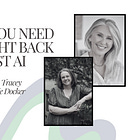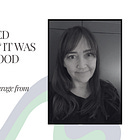Hello Writers 👋
I’ve been thinking a lot about creativity - how to nurture it and how to tap into the deep creative well we all hold inside of us. We are all creative beings. Some of us express this through words on a page, others through paint on canvas or pencil on paper, by using needle and thread or crochet hook and wool to magic original, wearable creations. Whether or not we use templates or patterns, or conjure our offerings purely from our imaginations, we are expressing essential parts of ourselves, exploring our humanity and creating connections where there were none before.
But when we write to a deadline or to fulfill the expectations of others, digging into what really matters to us can go by the wayside. Perhaps there isn’t enough time to properly explore an idea, or maybe that particular idea doesn’t fit with the genre in which we are writing. Or life gets in the way and we put our creative aspirations on hold.
All of the above is why we ran The Bum Glue Challenge last month - using a method called ‘free writing’ to override perfectionism and connect with our deepest creative self. I first came across this method of writing way back at the start of my own artistic explorations, when I read a book called Writing Down the Bones by Natalie Goldberg. A practising buddhist, Goldberg describes our subconscious as a compost in which we store and process all our experiences. Through journaling and writing prompts, and by following the ‘rules’ of not editing or censoring, just letting the words flow, free writing (sometimes called auto writing) is a way of uncovering ideas, emotions and beliefs we may not even be aware we hold. And if we set a timer for a minimum of 20 minutes to allow ourselves to get into the flow of the writing, we may produce words that surprise, frighten, enlighten and illuminate.
A variation of this is to use the same technique to write from a character’s point of view, which allows us to delve into their psyche and discover things we may not yet know about them. The better understanding we have of our characters, the more empathy we can create with them for our readers,
And the better we understand ourselves the more our own experiences will inform our writing.
In a similar vein, Julia Cameron’s morning pages (explained in her classic book The Artist’s Way) invite us to free-write three pages on first waking, using the same guidelines: no censoring and no editing. This technique helps declutter our brain in order to get to the ‘good stuff’ which we can then focus on in our ‘other’ writing. Sometimes this practice comes up with gems we will want to use elsewhere, but that is a bonus. Morning pages are not meant to be read after completion, or shared with anyone. Their function is one of downloading, of making space for our creative selves to grow and flourish.
As someone who has been a published author for the last thirteen years, much of my time is spent dreaming up and writing stories for publication. Stories that are part of a specific genre and will be read by a certain audience. In all of them I’ve been able to explore issues close to my soul - family relationships, mother-daughter bonds, dealing with loss and grief, the importance of connecting with the natural world - by filtering them through the experiences of my protagonists and supporting characters. But it’s always with the knowledge that these words will be published and read by others, so that caveat does lead to some kind of censorship.
My recent yearning to return to journaling and free-writing has probably been triggered by my awareness of having entered a new season of my life, with the arrival of grandchildren and the loss of my mother, both of which have created a sense of my own mortality and questions about life and death. Being able to free-write about these thoughts and feelings is allowing me to come to a greater understanding of who I am NOW and what it is I want to write about going forward.
Free-writing is a gift for any writer, a tool we can use at any time to broaden our writing horizons and excavate our deepest emotions. That can be a scary prospect but if we want the words we share with others to make them feel something we must allow ourselves to feel those things first.
Only then will we truly connect.
Free-writing Exercise: If you haven’t tried free-writing and would like to give it a try, here’s a great prompt you can come back to at any time.
Set a timer for 20 minutes (or longer if you have more time). Using a pen/pencil and paper, start with the prompt phrase ‘I want to write about…’ and write. Let whatever wants to come out pinto the page. Go below the surface. Dig deep. Do not re-read, censor yourself or stop. If you get stuck, repeat the opening phrase and keep going.
I’d love to hear about your experiences with free-writing so feel free to share them in the comments.
What I’m Reading…
I’ve just finished One Hundred Years of Betty by Debra Oswald. This ‘fictional memoir’ follows the life of Betty from her early childhood as one of ten children living in poverty in Britain, through her emigration to Australia, her marriage, children, lovers, friendships and, inevitably, loss. Betty is just the kind of protagonist I love - strong and feisty but also vulnerable and wounded, and while the nature of the story means there’s no drive towards a plot climax, sharing Betty’s experiences through so many personal and societal upheavals was rewarding and engaging. This is a long one, but if you love social history backdrops and a story that makes you both laugh and cry I highly recommend it.
What I’m Listening To…
I recently finished the audiobook of Hagitude by Sharon Blackie. This is a look at ageing through the lens of a variety of myths about women dating back to ancient times. It’s a thought-provoking look at what it means to be a woman in the later stages of life and how we can navigate these later years by drawing on the innate power and strength women have cultivated for centuries. Reading this book prompted me to check out Sharon Blackie’s website where I found more resources on this fascinating topic and the world of Jungian psychology. Next on my reading list: The Enchanted Life: Reclaiming the Magic and Wisdom of the Natural World.
What I’m Watching…
We’ve just started Season 4 of Clarkson’s Farm, and like all previous seasons it’s a hoot. Yes, Jeremy Clarkson is uber-rich and privileged, but watching him navigate the ups and downs of farming life with next to no knowledge on what he’s doing has been highly entertaining. This season he’s opening a pub and having ongoing battles with the council. Nothing like a good conflict to drive the story!
My daughter and I have dived into Season 1 of Ransom Canyon, a Virgin River-Yellowstone hybrid. We’re about five episodes in and while it’s corny and cliched, it has horses, romance, great scenery and plenty of angst. I’m up for all that so will see it through to the end.
What have you been watching/listening to/reading of late?








I also loved Betty and Clarkson’s Farm x
Journalling is great for getting thoughts out of the hamster wheel in your head.
I’ve got a lot of changes coming up this year and I feel a strong need to get my journal book out 💕